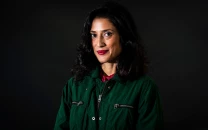Pakistan's climate hope
True progress in both mitigation and adaptation requires a united effort from all sectors of society.

We often encounter disheartening stories about climate change, both globally and within Pakistan. It seems we're consistently falling short of our goal to limit global temperature increases to 1.5 degrees Celsius. Last year's breach of this threshold confirms we're now struggling to avoid exceeding the 2-degree mark. As an Urdu poet once observed, ignorance truly is bliss.
Many Pakistanis, even those with advanced degrees, seem to embrace this philosophy, remaining remarkably unconcerned by the alarming climate data. In contrast, Westerners, with their continued reading habits, are deeply troubled by the worsening climate situation. However, they possess a degree of preparedness that mitigates their immediate sense of crisis.
The real concern lies with developing nations like ours, which are not only ill-equipped to handle the escalating impacts of climate change but also largely unaware of the gravity of the situation, often relegating discussions to casual conversations over tea or coffee.
Greta Thunberg, a young global climate leader, is absolutely correct to question the reassurances from older generations that everything will eventually be alright. What evidence do they have that they can effectively address this crisis? How can a generation that was slow to recognise the severity of the threat, and even slower to take meaningful action — signing the Paris Agreement in 2015, which remains largely theoretical — claim to have the solution?
The stark reality of climate change, coupled with the older generation's inadequate response, is enough to deeply disturb anyone who understands the complexities of the issue. Greta is right to point out that it's been over hundred years since Svante Arrhenius first warned about climate change, yet we're still just talking about policy.
While it's true that some older generation global climate leaders are working hard to achieve real progress, it's clear we haven't even reached the peak of global emissions, let alone started to reduce them. Despite our efforts to transition to renewable energy and use carbon offset markets, emissions continue to rise.
Similarly, at the national level, we're fortunate to have a few competent climate leaders in government, but their impact is limited. True progress in both mitigation and adaptation requires a united effort from all sectors of society — government, business and civil society.
Even those with short memories will recall the Pakistani delegation head who, alongside Bangladeshi climate scientist Saleemul Huq, played a crucial role in advancing the Loss and Damage Fund framework at COP27. However, even the most talented individuals cannot do so much when the broader society isn't taking the issue seriously.
On the other hand, there's a powerful source of hope: the younger generation. The educated youth, in particular, are actively preparing to take action against climate change. If you look at social media, beyond the usual trending content, you'll find a significant number of posts about climate change.
Many of these come from students in both public and private universities, who are using their IT skills to maximise efficiency and minimise resource use. While older generations struggle to adapt to AI, young people are mastering it, leveraging this new technology to work smarter. Organising events used to be challenging due to cost and attendance issues, but online platforms have made it much easier to host webinars instead of traditional seminars, which often prioritise the last informal agenda item.
Recently, a comprehensive, volunteer-led climate activism free training programme yielded remarkable results. All the participants were young graduates, under 30, with a significant number being young women. The online format allowed for participation from across Pakistan, including remote regions.
Participants were tasked with writing white papers on climate change in their local areas. Their passion truly shone through as they detailed regional climate issues, perhaps not with formal expertise, but with a clear dedication to covering every aspect. It was truly striking to see white papers addressing climate challenges in places like Hangu, Aliabad Hunza, Zhob, Kharian, Jhang Shahdadpur and numerous other smaller cities. Impressively, many even included estimates of local greenhouse gas emissions, demonstrating their growing understanding of the complexities of GHG accounting.
This isn't just about 40 hopeful graduates. Across every province, especially in Punjab, Khyber Pakhtunkhwa and Gilgit-Baltistan, young people are actively working to combat this global threat that affects us all. They're effectively using social media to expand their reach, but unfortunately, they often lack support from the government or businesses.
This is largely because those in major cities have easier access to influential figures, allowing them to gain visibility and demonstrate their commitment. However, young people in smaller cities struggle to travel between their hometowns and the federal or provincial capitals to secure support for their climate action initiatives. There's an urgent need to establish district-level mentorship programs, led by truly passionate individuals, to guide and support our future climate leaders.
If we don't immediately develop a framework to meaningfully involve young people in national and provincial climate initiatives, they risk turning to unproductive climate activism. This means simply criticising the government and businesses, instead of collaborating to achieve our Nationally Determined Contributions' (NDCs) goals.
Whether it's a technical, advocacy or educational project, without participation of our young people, it may have the experience of older generations, but it will lack genuine passion. To see this dynamic in action, just attend a board meeting of any high-level organisation. Senior officials often dwell on issues, paralysed by the fear of negative repercussions if they take action.














COMMENTS
Comments are moderated and generally will be posted if they are on-topic and not abusive.
For more information, please see our Comments FAQ